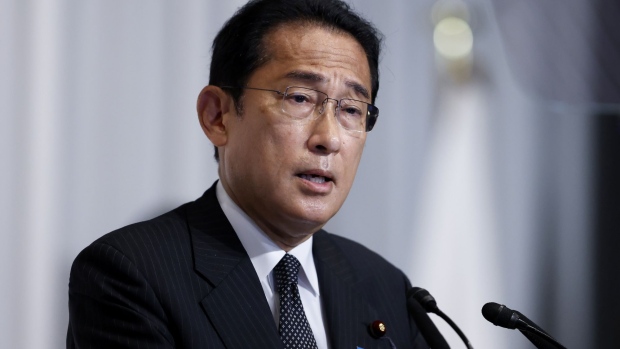Jul 14, 2022
Japan’s Kishida Risks Political Fight With Vow to Take Up Abe’s Legacy
, Bloomberg News

(Bloomberg) -- Three days after Shinzo Abe’s murder, Japanese Prime Minister Fumio Kishida vowed to honor his legacy by taking up a cause that had eluded the late former premier: Revising the country’s pacifist constitution. Minutes later, Kishida was explaining how hard that might be.
Successive leaders, including Abe, have failed to overcome the legal and political hurdles required to amend the founding document and legitimize the existence of Japan’s military. Any change to the document, which was drafted by the US during its postwar occupation, is likely years away, even though Kishida’s coalition won enough seats Sunday to start the process.
Abe, 67, was fatally shot at close range July 8 while making a campaign speech, an attack that robbed the ruling Liberal Democratic Party of its most prominent advocate for changing the constitution. While proponents argue such a revision would assert Japan’s independence and shore up its security, the idea has long been controversial at home and across the region, where memories of Japan’s wartime aggression run deep.
“I’m pessimistic about the chances for constitutional reform,” said Brad Glosserman, deputy director of the Center for Rule-making Strategies at Tama University. “It’s one thing to be able to do that when Abe’s in the wings pushing for that agenda, but he’s gone now and they’ve lost that motivating force.”
Revising the document requires a two-thirds majority in both houses of parliament to approve a proposal that must then pass a national referendum. Kishida also noted a consensus must first be forged among lawmakers, who have broad disagreements over how exactly to change the document and its pacifist Article 9.
“It’s not just two-thirds approving of the idea of revision -- two-thirds must agree to the actual content,” Kishida told reporters after the election.
The premier said he would aim to get a proposal made as soon as possible and encourage debate in the autumn. That effort has been buoyed not only by the outpouring for Abe, but concern over Russia’s invasion of Ukraine. Some 58% of respondents told a Yomiuri newspaper poll this week that they had positive expectations for a debate over changing the constitution.
“He’s in a good position to actually go ahead with this,” said Narushige Michishita, a professor focusing on security at the National Graduate Institute for Policy Studies, said of Kishida. “He is regarded as liberal, so even if he says: ‘Let’s revise the constitution,’ people will not say Japan is becoming more militaristic.”
Still, by the time a proposal comes together, public interest in the revisions may have waned. Respondents to the Yomiuri poll ranked constitutional revisions last -- far behind the economy, employment and inflation -- among a choice of 10 issues that Kishida should prioritize.
Adding wording to Article 9 to make explicit the legality of Japan’s Self-Defense Forces -- whose existence is currently seen by many scholars as unconstitutional -- would be popular with LDP supporters. The country maintains almost 250,000 troops, hundreds of fighter jets and dozens of warships, although their activities are constrained by law.
However, it would risk alienating the party’s Buddhist-backed junior coalition partner, Komeito. Most Komeito lawamkers want to keep Article 9 unchanged, a survey by the Mainichi newspaper found.
Revising it could also draw protests from China, where there are already concerns about Kishida’s plans for a dramatic upgrade of the military with a commensurate increase in spending. Another LDP proposal -- giving the cabinet additional powers in the event of an emergency -- could be even more controversial.
Coping with a new surge in Covid-19, dealing with inflation and trying to stabilize Japan’s energy supply in the face of soaring prices and Russian threats are all high on Kishida’s agenda for the coming months, he told another news conference Thursday. The constitution came lower on the list, and Kishida must in any case keep the matter at arm’s length, since any proposal must come from parliament, rather than the government.
Yet keeping up talk about revision could be a useful way of enticing Abe’s right-wing backers to rally behind a leader long seen as dovish, Michishita said. Kishida may eventually seek to push a proposal through toward the end of his premiership as a way of leaving a legacy, he added.
“Everyone talks about changing the constitution, but when you look at the content, they’re all talking about different things,” said Tomoaki Iwai, professor emeritus at Nihon University. “It’s going to be tough.”
©2022 Bloomberg L.P.






